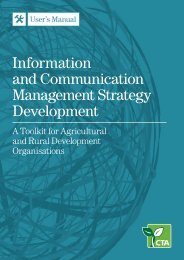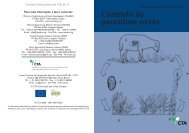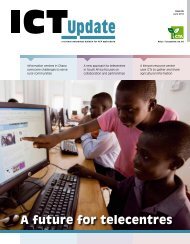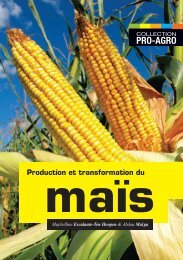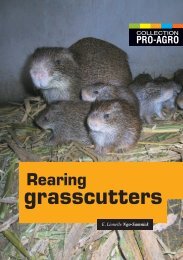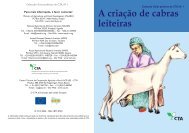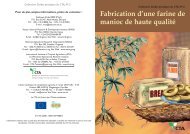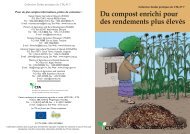Policy framework for Pastoralism in Africa
Policy framework for Pastoralism in Africa
Policy framework for Pastoralism in Africa
- No tags were found...
Create successful ePaper yourself
Turn your PDF publications into a flip-book with our unique Google optimized e-Paper software.
The process <strong>for</strong> reach<strong>in</strong>g a common understand<strong>in</strong>g of pastoralism across <strong>Africa</strong> <strong>in</strong>volves two ma<strong>in</strong>processes. The first is the broad process of dialogue between government and pastoralists, politicalrepresentation of pastoralists, engagement with pastoral leaders and civil society, and <strong>for</strong>ums at differentlevels, from local to regional. Second is the need to support dialogue with contemporary economicanalysis which reveals the true economic value of pastoralism, and assists government to positionpastoralism relative to other land use systems, and other productive livelihoods and sectors.Strategy 1.2 Demonstrat<strong>in</strong>g commitment to pastoral policy development<strong>Africa</strong>n leaders, through the AU, have expressed commitment to tak<strong>in</strong>g jo<strong>in</strong>t responsibility <strong>for</strong>strengthen<strong>in</strong>g mechanisms <strong>for</strong> promotion of peace and security, shared values, cooperation/partnershipand development, and <strong>in</strong>stitutional strengthen<strong>in</strong>g. The commitment of the AU to the eradicationof absolute poverty <strong>in</strong> <strong>Africa</strong> <strong>in</strong>clud<strong>in</strong>g <strong>in</strong> pastoral communities is also evident from several<strong>in</strong>itiatives. These <strong>in</strong>clude the New Economic Partnership <strong>for</strong> <strong>Africa</strong>n Development and its long-termobjectives, which <strong>in</strong>clude eradicat<strong>in</strong>g extreme poverty <strong>in</strong> <strong>Africa</strong> and plac<strong>in</strong>g <strong>Africa</strong>n countries, both<strong>in</strong>dividually and collectively, on a path to susta<strong>in</strong>able growth and development, and halt<strong>in</strong>g itsmarg<strong>in</strong>alization <strong>in</strong> the globalization process.Moreover, as members of the United Nations, <strong>Africa</strong>n governments are also committed to the atta<strong>in</strong>mentof the Millennium Development Goals (MDGs), which <strong>in</strong>clude the eradication of extremepoverty and hunger, achievement of universal primary education, reduction of <strong>in</strong>fant mortality,improvement of maternal health, combat<strong>in</strong>g HIV/AIDS, malaria and other diseases, achievement ofgender equality and women empowerment, ensur<strong>in</strong>g environmental susta<strong>in</strong>ability, and promot<strong>in</strong>gglobal partnership. These Goals have profound relevance <strong>for</strong> pastoral communities. The realizationof these goals calls <strong>for</strong> a policy plat<strong>for</strong>m which will <strong>for</strong>m the basis <strong>for</strong>:i. Cont<strong>in</strong>ent-wide commitment to the political, social and economic development of pastoralcommunities and pastoral areas;ii. Re<strong>in</strong><strong>for</strong>c<strong>in</strong>g the contribution of the livestock sector to the national, regional and cont<strong>in</strong>entaleconomies.Demonstrat<strong>in</strong>g real commitment to pastoral policy necessitates changes <strong>in</strong> attitude towardspastoralism and realiz<strong>in</strong>g the need to:i. Abandon biased perceptions that pastoralism is an archaic livestock production system andpastoralist suffer<strong>in</strong>g is self-<strong>in</strong>flicted, because pastoralists choose to pursue obsolete traditionallife style;ii. Recogniz<strong>in</strong>g the many positive aspects of pastoralism and <strong>in</strong>tegrat<strong>in</strong>g them <strong>in</strong>to national andregional socio-economic development strategies – as described <strong>in</strong> more detail under strategy1.1 above.Stakeholders <strong>in</strong>volved <strong>in</strong> pastoral policy development process should also devise measures<strong>in</strong>clud<strong>in</strong>g affirmative action that will:i. Ensure equitable distribution of national resources to all the segments of society <strong>in</strong>clud<strong>in</strong>gpastoral communities;ii. Improve budgetary allocation to address marg<strong>in</strong>alization of pastoral communities;iii. Institutionalize participatory monitor<strong>in</strong>g and evaluation of the implementation of suchmeasures.Secur<strong>in</strong>g, Protect<strong>in</strong>g and Improv<strong>in</strong>g the Lives, Livelihoods and Rights of Pastoralist Communities33




